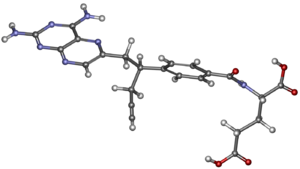Chemistry:Pralatrexate
 | |
 | |
| Clinical data | |
|---|---|
| Trade names | Folotyn |
| AHFS/Drugs.com | Monograph |
| License data |
|
| Routes of administration | Intravenous |
| ATC code | |
| Legal status | |
| Legal status | |
| Identifiers | |
| |
| CAS Number | |
| PubChem CID | |
| IUPHAR/BPS | |
| DrugBank | |
| ChemSpider | |
| UNII | |
| KEGG | |
| ChEBI | |
| ChEMBL | |
| Chemical and physical data | |
| Formula | C23H23N7O5 |
| Molar mass | 477.481 g·mol−1 |
| 3D model (JSmol) | |
| |
| |
| | |
Pralatrexate, sold under the brand name Folotyn, is a medication used for the treatment of relapsed or refractory peripheral T-cell lymphoma (PTCL).[3][4]
Pralatrexate was approved for medical use in the United States in September 2009, as the first treatment for Peripheral T-cell Lymphoma (PTCL), an often aggressive type of non-Hodgkins lymphoma.[4][5]
Medical uses
Pralatrexate is indicated for the treatment of people with relapsed or refractory peripheral T-cell lymphoma (PTCL).[3]
Mechanism
Pralatrexate is a dihydrofolate reductase inhibitor.[3]
Discovery
Research on this class of drugs began in the 1950s at SRI International, where scientists were focused on developing new chemotherapies and antifolates that would be effective against tumor cells.[6]
In the late 1970s, researchers at Memorial Sloan Kettering Cancer Center discovered that cancerous cells take in natural folate through a protein identified as plasma membrane transporter (now referred to as "reduced folate carrier type 1" or "RFC-1"). Further research showed that when normal cells evolve into cancerous cells they often overproduce RFC-1 to ensure they get enough folate.[7]
A subsequent scientific collaboration was ultimately formed among SRI International, Memorial Sloan Kettering Cancer Center, and the Southern Research Institute with the intention of developing an antifolate with greater therapeutic selectivity – an agent that could be more effectively internalized into tumors (transported into the cells through RFC-1) and would be more toxic to cancer cells than normal cells.[7]
This collaboration, supported by the National Cancer Institute,[8] led to the identification of pralatrexate in the mid-1990s. Pralatrexate was later licensed to Allos Therapeutics in 2002 for further development.[9] Allos Therapeutics, Inc. was acquired by Spectrum Pharmaceuticals, Inc. on September 5, 2012. Allos is a wholly owned subsidiary of Spectrum.[10]
Society and culture
Legal status
Pralatrexate was approved for medical use in the United States in September 2009.[5][4]
Economics
Some oncologists, patient groups, and insurance companies criticized the cost of $30,000 a month or more, which could reach a total of $126,000 during a course of treatment.[11]
References
- ↑ "Prescription medicines: registration of new chemical entities in Australia, 2015". 21 June 2022. https://www.tga.gov.au/prescription-medicines-registration-new-chemical-entities-australia-2015.
- ↑ "Summary Basis of Decision (SBD) for Folotyn". 23 October 2014. https://hpr-rps.hres.ca/reg-content/summary-basis-decision-detailTwo.php?linkID=SBD00427&lang=en.
- ↑ 3.0 3.1 3.2 "Folotyn- pralatrexate injection". 28 May 2020. https://dailymed.nlm.nih.gov/dailymed/drugInfo.cfm?setid=9f3d9c4d-9386-4451-b712-0fbdc5478d8f.
- ↑ 4.0 4.1 4.2 "FDA Approves First Drug for Treatment of Peripheral T-cell Lymphoma". U.S. Food and Drug Administration (FDA) (Press release). 25 September 2009. Archived from the original on 1 October 2009. Retrieved 21 October 2020.
 This article incorporates text from this source, which is in the public domain.
This article incorporates text from this source, which is in the public domain.
- ↑ 5.0 5.1 "Drug Approval Package: Folotyn (Pralatrexate) Injection NDA #022468". 23 November 2009. https://www.accessdata.fda.gov/drugsatfda_docs/nda/2009/022468s000TOC.cfm.
- ↑ "Allos Therapeutics: News". http://ir.allos.com/phoenix.zhtml?c=125475&p=irol-newsArticle&ID=1277828&highlight., Allos Therapeutics Press Release, "Allos Therapeutics' Pralatrexate Demonstrates Anticancer Activity in Multiple Cancer Cell Lines".
- ↑ 7.0 7.1 [1], Memorial Sloan Kettering Cancer Center Press Release, "FDA Approves Lymphoma Drug Developed at Memorial Sloan Kettering".
- ↑ "The NExT Steps in Drug Development at NCI". NCI Cancer Bulletin. 20 October 2009. http://www.cancer.gov/ncicancerbulletin/archive/2009/102009/page4. Retrieved 21 October 2020.
- ↑ "FDA Approves Pralatrexate for Treatment of Peripheral T-Cell Lymphoma" (Press release). SRI International. 2009-09-25. Archived from the original on 2013-07-03. Retrieved 2013-07-10.
- ↑ "Purchase of Allos Therapeutics is completed". Denver Business Journal. 2012-09-07. https://www.bizjournals.com/denver/news/2012/09/05/purchase-of-allos-therapeutics-is.html.
- ↑ "Questioning a Cancer Drug That Costs $30,000 a Month". New York Times. December 4, 2009. https://www.nytimes.com/2009/12/05/health/05drug.html?_r=1&?8dpc. "The price of the new drug, called Folotyn, is at least triple that of other drugs that critics have said are too expensive for the benefits they offer to patients."
External links
- "Pralatrexate". Drug Information Portal. U.S. National Library of Medicine. https://druginfo.nlm.nih.gov/drugportal/name/pralatrexate.
- "Pralatrexate". NCI Drug Dictionary. National Cancer Institute. https://www.cancer.gov/publications/dictionaries/cancer-drug/def/pralatrexate.
- "Pralatrexate". 29 October 2009. https://www.cancer.gov/about-cancer/treatment/drugs/pralatrexate.
 |

